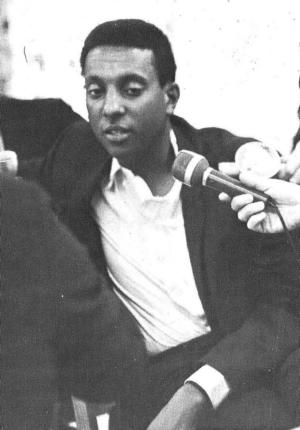 SKC Films Library |
| SKC Films Library >> African-Americans |
| Stokely Carmichael civil rights advocate
Stokely Carmichael was born in Port-of-Spain, Trinidad, on June 29, 1941. His parents immigrated to New York when he was a toddler, leaving him in the care of a grandmother until the age of 11, when he joined them. He became a naturalized citizen at 13. In 1956, Carmichael passed the admissions test to get into the elite Bronx High School of Science. Although the vast majority of his classmates were white and rich, he had many friends and even dated white girls. His attitude toward whites changed dramatically toward the end of his senior year, however, when he saw footage of a lunch counter sit-in in the South. He joined the Congress of Racial Equality (CORE) in protests against New York City Woolworth stores, the chain that was being "targeted" in Virginia and South Carolina, where he also joined sit-ins. Carmichael received scholarship offers to several prestigious predominantly white universities after graduating from high school in 1960, but chose to attend the historically black Howard University, where he majored in philosophy. He also became more active in the civil rights movement, joining the local branch of the Student Nonviolent Coordinating Committee (SNCC). He went on his first Freedom Ride in 1961, during which he was arrested in Jackson, Mississippi, for entering the "whites only" bus stop waiting room and jailed for 49 days. He remained active in the movement throughout his college years, and graduated with honors in 1964. Joining the SNCC as a full time staff member after graduation, Carmichael's eloquence and natural leadership led to him being put in charge of the Committee's voter registration drive in Lowndes County, Alabama, in 1965. In less than a year he had raised the number of registered black voters from 70 to 2,600 (300 more than the number of white voters in the county). Neither the Democratic nor Republican party made any effort to court the new voters, however, so Carmichael founded his own political party, the Lowndes County Freedom Organization. He chose a black panther as the party's official logo, and that logo later provided the inspiration for the Black Panthers (an otherwise unrelated activist organization founded in Oakland, California). By the time he was elected national chairman of the SNCC in May 1966, Carmichael had become convinced that racial equality would never be achieved through entirely peaceful means. One of his first actions as chairman was to make it clear that white members were no longer welcome. After James Meredith, the first black student to attend the University of Mississippi, was shot while marching from Memphis, Tennessee, to Jackson, Mississippi, Carmichael decided that the SNCC should carry on the march in his place. Upon reaching Greenwood, Mississippi, on June 16, he gave an address in which he called upon "Black Power" to bring about equality. Although he stopped short of openly advocating violence, many who heard his speech had already decided that equality would never be achieved through sit-ins and marches alone. As the year progressed, Carmichael became more openly supportive of violent protest. He completed his split with the nonviolent movement by resigning as chairman of the SNCC on May 12, 1967. After traveling to Cuba, China, North Vietnam, Guinea, and other "hotspots," Carmichael accepted an invitation to become prime minister of the militant Black Panther Party. He spent two years speaking around the country and writing essays on black nationalism, black separatism, and pan-Africanism before quitting the Party in 1969 due to its willingness to work with radical whites. He and his wife then moved to Guinea, where he changed his name to Kwame Ture (in honor of former Ghana dictator Kwame Nkrumah and Guinea President Ahmed Sékou Touré). Although he made frequent trips back to the United States to advocate pan-Africanism as the only viable way for blacks to achieve freedom, Carmichael maintained permanent residence in Guinea for the rest of his life. He died of prostate cancer on November 15, 1998.
SOURCES SEE ALSO |
| SKC Films Library >> African-Americans |
